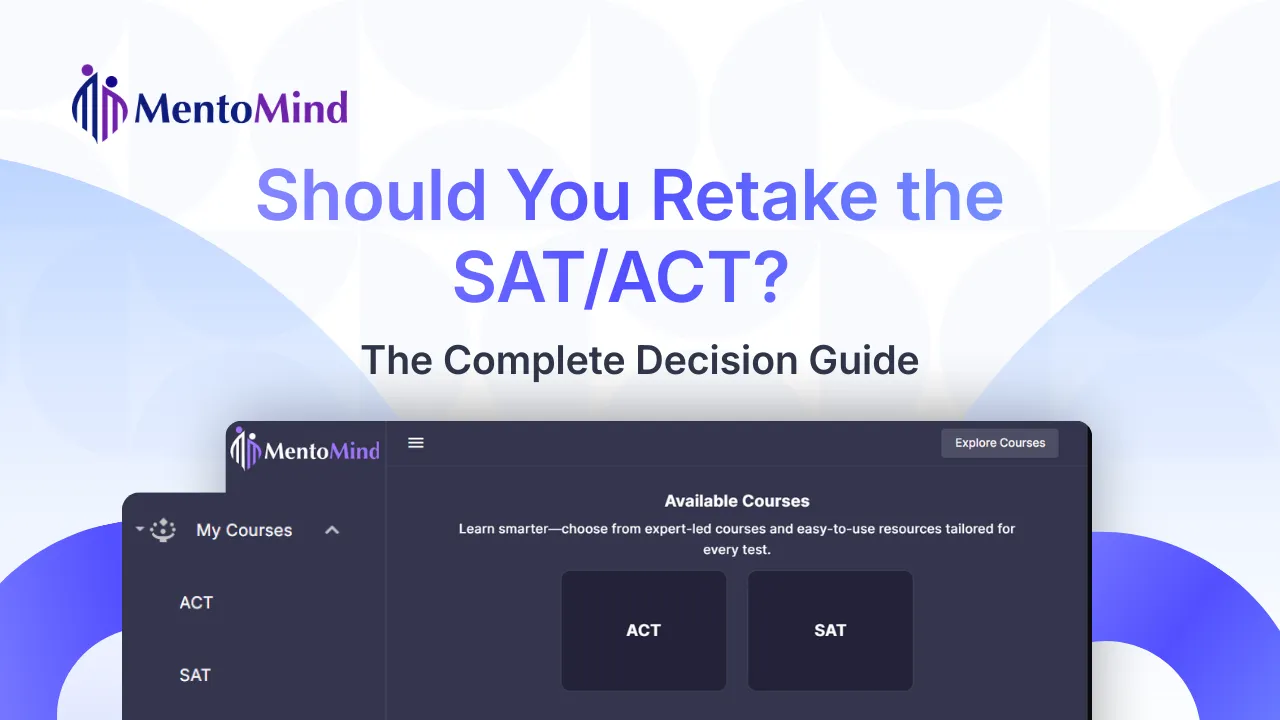Preparing for the SAT can be a significant challenge for many students, but with a structured and detailed study plan, the process becomes much more manageable. The key is to focus on efficiency while maximizing effectiveness. We at MentoMind would like to give you a comprehensive guide to creating a winning SAT study plan that helps your students prepare in less time while ensuring they are fully equipped for success.
Step 1: Assess Student Needs
Initial Diagnostic Test
Begin by administering a full-length, official practice SAT. This will serve as a diagnostic tool to establish a baseline score for each student. Analyze results to pinpoint strengths and weaknesses across the two main sections: Evidence-Based Reading and Writing (EBRW) and Math. This will allow for targeted instruction and practice.
Individual Goals
After the diagnostic test, hold one-on-one meetings with each student. Discuss their target scores, college aspirations, and areas of confidence versus concern. With these responses, create a personalized SAT study plan that focuses on each student’s individual needs. Encourage students to set realistic, measurable goals, such as improving by a specific number of points in each section. Students aiming for a T20 or Ivy League school should work on scoring 1500 and above.
Below is an approximation of how many hours students will need to study depending on how much they want to improve:
- 0-30 point improvement: 10 hours
- 30-70 point improvement: 20 hours
- 70-130 point improvement: 40 hours
- 130-200 point improvement: 80 hours
- 200-330 point improvement: 150 hours+
This approach ensures you create a winning SAT study plan for your students in less time, giving them clarity on how much effort is needed to achieve their goals.
Step 2: Set a Study Timeline
Ideal Duration: To effectively create a winning SAT strategy, a 10-week study plan leading up to the SAT test day is recommended. This allows ample time for review, practice, and consolidation of knowledge without feeling rushed.
Weekly Breakdown
Weeks 1-3: Focus on foundational knowledge and content review. This is the time for students to solidify their understanding of key concepts that are seen throughout the SAT.
Weeks 4-6: Shift to targeted practice. Students should work on their specific weaknesses while building on their strengths.
Weeks 7-9: Begin taking full-length practice exams and timed sections to simulate the actual test environment.
Week 10: Final review and test-day strategies to ensure students feel confident and prepared.
Ongoing: Students should create a detailed study calendar at the onset, considering their other commitments like school, homework, and extracurricular activities.
Step 3: Create a Weekly Study Schedule
Weekly Structure
Frequency: Encourage students to commit to studying 4-5 days a week, allowing for regular practice without burnout.
Duration: Each study session should last 1.5 to 2 hours to maximize focus and retention. If a session lasts longer, make sure to take 2-3 breaks for 5 minutes each to increase retention while studying.
Below is a sample schedule for the first 3 weeks of reviewing foundational knowledge. This can be adapted to each student’s specific needs.
Week 1: Foundations
- Monday: Focus on Math concepts (1 hour) + Vocabulary building (30 minutes).
- Wednesday: Reading comprehension strategies (1 hour) + Grammar and writing rules (30 minutes).
- Friday: Introduction to the SAT format and practice questions, covering both sections (1.5 hours).
- Tuesday and/or Thursday: Free choice to study anything wanted or necessary.
Week 2: Focus on Weak Areas
- Monday: Advanced Math concepts (1 hour) + Vocabulary review with flashcards (30 minutes).
- Wednesday: Reading practice passages (1 hour) + Writing practice (30 minutes) focusing on grammar and essay structure.
- Friday: Math practice section (1 hour) + Review errors from practice to identify common mistakes (30 minutes).
- Tuesday and/or Thursday: Free choice to study anything wanted or necessary.
Week 3: Consolidation
- Monday: Review weak areas identified in previous weeks (1 hour) + Timed vocabulary quizzes (30 minutes).
- Wednesday: Full-length EBRW practice exam (1.5 hours) to build endurance and familiarity with the test format.
- Friday: Math practice section with a specific focus on time management strategies (1 hour).
- Tuesday and/or Thursday: Free choice to study anything wanted or necessary.
Step 4: Monitor Progress
Weekly Check-Ins
Regular progress monitoring is crucial to create a winning SAT study plan for your students. Hold 15-20 minute check-ins each week to assess individual progress. These can be one-on-one meetings or small group discussions. Review practice test scores and discuss any difficulties students are experiencing. Use this time to celebrate improvements, no matter how small, to maintain motivation.
Progress Tracking
Create a tracking spreadsheet for each student. Include columns for practice test scores, study hours, topics covered, and areas for improvement. Encourage students to analyze not only incorrect answers but also those answered correctly to ensure understanding. This visual representation can help students see their progress over time.
Step 5: Test-Taking Strategies
Timing Practice
Integrate timed sections into practice sessions every other week to help students become accustomed to the pacing of the actual test. Teach them to manage their time effectively, such as allocating a specific number of minutes per question and recognizing when to move on if they get stuck.
Stress Management
Introduce relaxation techniques, such as mindfulness exercises or deep-breathing techniques, especially in the weeks leading up to the test. Encourage students to practice these techniques during study sessions to help alleviate test anxiety.
Step 6: Final Preparations
Week 10 Focus
- Monday-Wednesday: Engage in a final review of key concepts and effective test-taking strategies. Allocate 1 hour each day for focused revision.
- Thursday: Light review day; avoid heavy studying to prevent burnout. Discuss test day logistics, including what to bring, where to go, and when to arrive.
- Friday: Conduct relaxation techniques and visualization exercises. Encourage students to visualize themselves successfully completing the test.
Rest and Nutrition
Emphasize the importance of sleep, healthy eating, and staying hydrated in the week leading up to the test. Remind students that their brain functions best when they are well-rested and nourished.
Conclusion
Creating a structured and specific SAT study plan can empower your students to approach the exam with confidence and clarity. By assessing their needs, setting a clear timeline, and providing targeted resources and support, you can help them create their ideal winning SAT study plan to achieve their academic goals. With dedication, strategic preparation, and consistent practice, your students will be well-equipped to excel on test day and take significant steps toward their future college aspirations.
Ready to Reach Your Full Potential on the SAT?
Upgrade your preparation with MentoMind’s comprehensive digital SAT tools. Start your free trial now and join thousands of students who have achieved their academic goals with our expert guidance!



